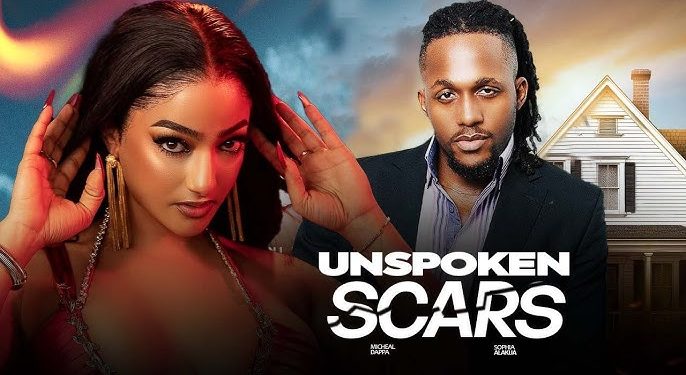Biodun Stephen’s latest feature, Unspoken Scars, currently streaming on Biodun Stephen TV on YouTube, deserves far more buzz than it has received. The film is a masterclass in storytelling, combining layered performances, deliberate casting, and a daring narrative that confronts generational trauma head-on.
A Wholesome Yet Heart-Wrenching Watch
Clocking in at just over two hours, Unspoken Scars is more than just entertainment—it is a wake-up call. The title itself is fitting, as the movie explores the invisible wounds carried from childhood into adulthood. With a cast featuring Michael Dappa, Sophie Alakija, Charles Born, Michael Ejoor, and Biodun Stephen herself, the film achieves authenticity by giving life to characters who feel painfully real.
Iniobong’s Journey and the Cycle of Trauma
At the center of the film is Iniobong, played with conviction and nuance, delivering one of the standout performances of the production. Her character embodies a heartbreaking paradox—choosing not to become like her abusive mother, yet unconsciously replicating the destructive tendencies of her father.

This cycle mirrors the harsh reality many children face in toxic households, where enduring abuse “for the sake of the marriage” inadvertently creates another generation of brokenness. Unspoken Scars forces viewers to confront the uncomfortable truth: children raised in pain often risk becoming the very villains they once resented, unless they consciously choose another path.
Kunle: A Victim in Silence
Opposite Iniobong is Kunle, brought to life by Michael Dappa in what can easily be described as the performance of his career. Stretching beyond his usual range, Dappa delivers raw pain, frustration, and emotional exhaustion that makes the audience ache for him.
Kunle’s story is especially powerful because it reflects a rarely explored reality in Nollywood—a man suffering abuse in silence. Despite having supportive friends like Paulo and Tee, Kunle remains trapped, emotionally suffocated by a partner who never apologizes, constantly undermines him, and strips him of his dignity.
His silence is puzzling yet realistic, mirroring the countless men who endure quietly due to stigma or misplaced loyalty. It raises critical questions: why do people ignore glaring red flags in relationships? And at what cost?
A Writer’s Bold Choice
The film’s script deserves applause for its bravery. By shifting the narrative away from the more familiar story of women as victims, Unspoken Scars flips the lens, revealing how abuse and toxicity can trap anyone, regardless of gender. It challenges viewers to rethink preconceived notions about relationships and power dynamics.
Notably, Iniobong’s arc resonates with another Biodun Stephen film, I Choose Me, but this time the victim is male. It’s a refreshing, thought-provoking shift that adds to the richness of the story.
Supporting Cast and Missing Pieces
Paulo and Tee serve as anchors in Kunle’s chaotic world, offering the kind of friendship and support many victims lack. Meanwhile, Ese—the ex—emerges as an unexpected blessing, providing a reminder that sometimes, healing comes from the least expected sources.
However, one noticeable gap in the story is the absence of Kunle’s family. Not a single mention is made of them throughout the film, leaving viewers to wonder whether this was a deliberate artistic choice or simply an oversight. Either way, it sparks conversation about how families—or their absence—shape our choices in relationships.
The Bigger Message
At its core, Unspoken Scars isn’t just a film—it’s a mirror. It speaks to parents who may unknowingly be breeding future abusers by normalizing toxicity in the home. It calls out individuals who project unresolved trauma onto their partners. And most importantly, it reminds us that healing is possible. Children do not have to become the flawed versions of their parents—they can break free, rewrite their stories, and chart healthier paths.
For anyone weighed down by unresolved pain, the film quietly points toward a solution: therapy, counseling, and honest self-reflection.
Final Thoughts
Unspoken Scars is gripping, raw, and unflinchingly reflective. It challenges social norms, pushes boundaries, and shines a light on issues often swept under the rug.
Biodun Stephen has once again proven her genius as a storyteller who knows how to blend entertainment with purposeful messaging. For those who haven’t yet seen it, this is one Nollywood film you’ll regret missing.
5/5 Highly Recommended
Watch it now on YouTube via Biodun Stephen TV and join the conversation.

















